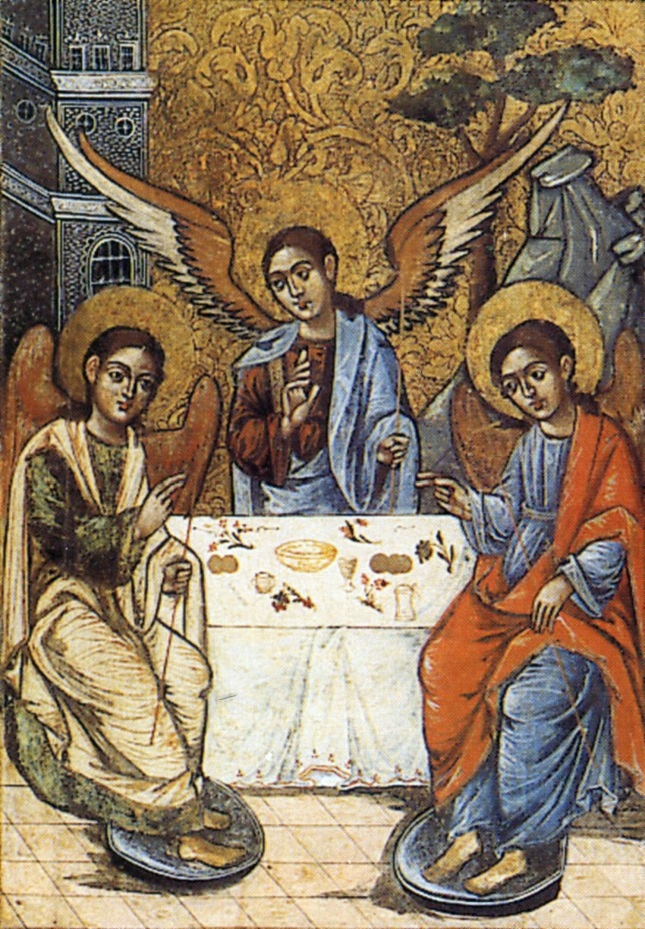Podcast: Play in new window | Download
Subscribe: Spotify | Email | RSS
This episode is the last part of my response to Dr. Beau Branson’s presentation on the monarchy of the Father (trinities podcast episodes 239-242). Here I leave aside issues of terminology, historical theologies, and historical narrative, and focus on the theological merits of Dr. Branson’s account of the Triad. In short, I think it that “monarchical trinitarianism” (MT) needs further development, as it leaves pressing, central theological questions unanswered.
Along the way I get analytic, explaining how (I believe) Dr. Branson’s Triad theory would deal with these four claims, only three of which (as a matter of logic) can be true. (Note: these are just four claims, not an argument with premises and a conclusion.)
The Independence Tetrad
- The Son is eternally generated by the Father.
- If a being is generated by another, it exists because of that other.
- Full divinity implies not existing because of any other.
- The Son is fully divine.
The interesting thing about these four claims is that they can’t all be true. If the Son is eternally generated and so exists because of the Father, whereas full deity requires not existing because of any other, then the Son is not divine. (1 & 2 & 3 imply the falsity of 4.) If to be generated is to be caused, and full deity requires not being caused by any other, and the Son enjoys full deity, then the Son can’t have been caused by the Father. (2 & 3 & 4 imply the falsity of 1.) If they Son is fully divine, so doesn’t exist because of any other, and if he was generated, then it must be false that if a being is generated, it is caused to exist by another. (1 & 3 & 4 imply the falsity of 2.) Finally, if the Son is generated and so exists because of another, and he’s fully divine, then full divinity must not require not existing because of any other. (1 & 2 & 4 imply the falsity of 3.) What is a thinking Christian to do? Which should be denied? One would think, the one which we have the least reason to believe. Which is that?
I also offer Dr. Branson (really, all thinking Christians) the following argument, which starts with the Nicene claim that the Son is the same in essence/substance as the Father, and ends with a denial of monotheism. It’s not an argument I assert. Rather, it seems to me that any decently developed Christian theology ought to tell us which premise or premises should be denied. (It is, rightly, a rare Christian theology indeed which would simply accept the argument as sound!)
The Argument from Nicene Theology vs. Monotheism

- Jesus is divine (has the essential quality of divinity). (Premise)
- If something has the essential quality divinity, it is a god. (Premise)
- Therefore, Jesus is a god. (1,2)
- The Father is divine. (Premise)
- Therefore, the Father is a god. (2,4)
- Jesus and the Father are either the same god, or they are two different gods. (Premise)
- If Jesus and the Father were the same god, they could not differ in any way. (Premise)
- But the Father and Son do differ. (Premise)
- Therefore, Jesus and the Father are not the same god. (7,8)
- Therefore, Jesus and the Father are different gods. (6,9)
- Therefore, there are at least two gods. (10)
- Therefore, monotheism is false. (11)
When it comes to the above argument, I deny 1, because of the New Testament. Which does Dr. Branson deny? Which do you deny, Mr. or Ms. Thinking Christian? Let us know in the comments below or in the Facebook group.
Thanks again to Dr. Branson; he’s a friend to me and to the podcast, and I hope we will have him on again.
Links for this episode:

- Information on Dale’s upcoming debate with Dr. Michael Brown.
- 21st Century Reformation website
- Restitutio podcast
- podcast episodes by or about Dr. Beau Branson
- Proverbs 27:17
- “social” Trinity theories
- podcast 231 – Swinburne’s Social Theory of the Trinity
- podcast 57 – Richard Swinburne on the Trinity
- podcast 28 – Interview with Dr. William Hasker about his Metaphysics and the Tripersonal God – Part 2
- podcast 27 – Interview with Dr. William Hasker about his Metaphysics and the Tripersonal God – Part 1
- Samuel Clarke, The Scripture Doctrine of the Trinity
- podcast 145 – ‘Tis Mystery All: the Immortal dies!
- podcast 124 – a challenge to “Jesus is God” apologists
- This week’s thinking music is “Toddler Guitarist” by Admiral Bob.



Hi Dale! I’m not sure how this would apply to Dr Brandsen’s theology, but the aseity street runs both ways for Father and Son. If the Father eternally is one that generates, then He is dependent upon that which is eternally generated to be what He is. The Father is as dependent upon the Son as the Son is upon the Father in trinitarian theology, or at least should be.
Also, in regards to your comments on fatherhood not being an essential attribute of God, I would press you on the effects of God’s becoming a father on His essential immutability. Being not a father nor one who generates eternally, then becoming something fundamentally different requires a change to God’s essential being.
Just some thoughts. I look forward to attending the debate in January.
Andrew
P.S. I’ve written a book on the topic of the Trinity called “The Triune God and the Doctrine of the Covenant:Answering Unitarian Objections to the Doctrine of the Trinity”. It’s available on Amazon for cheap.
I’d say that 7 is false. You need to say more about the predicate “god”. F and S could share numerically the same divine nature, differ, and be the same God.
Hey Scoot – Scott? 🙂 Good to hear from you. We live in adjoining states now. Hope your semester is ending up well!
7 presupposes that to say that some a and some b are the same F means that (1) a is an F, (2) b is an F, and (3) a = b. As you know, this last bit implies that “they” can’t ever differ (’cause the one just is the other).
Myself, I think that’s self-evident, that saying “a and b are the same F” is to assert those three claims. If we discover some difference, any difference between this a and this b we conclude that we were mistaken before – they’re not the same F after all – they’re not the same anything, we think. But someone who opts for a relative identity theory will deny all of this sensible thinking. (Rascally metaphysicians.) It’s interesting – it seems to me that Christian philosophers are increasingly being driven this way, tending to abandon the at first glance attractive “social” approaches or the more common one-self theories. RI Trinity theories are odd; they do the work, logically, demanded by the “Athanasian” creed, but they don’t sit well with the ideas that the one God is the Trinity as a whole, and that Father and Son aren’t gods at all, but are rather “Persons” somehow “within” the one god. I can’t recall any recent trinitarian creed that sounds like it was written by an RI theorist. Can you? We read of “three Persons in one God” or “God in three Persons,” etc. but not that this one’s a god, and so is this one and this one – but don’t worry, *they’re the same god*.
In any case, relative identity trinitarianism has a big problem with the NT. NT authors explicitly and implicitly (but clearly) say that the Father is the Son’s god. Relative identity trinitarians want to say that the Father and Son are the same god. But no one can be god of himself; god-of (i.e. god over) is necessarily non-reflexive. If any a is god over b, then it follows that a and b are not the same god. Either that b isn’t a god, or he’s a different god than a. (Someone might say that a certain god is “god of himself” I suppose, but that would just amount to denying that he has anyone over him – it’d be a funny way to assert that he is top level.)
It’s a bit like saying that tennis player a outranks tennis player b (at some one time). If we know that, that we know that a and b are not the same player.
Of course another problem is that the NT in no way implies that the Son is a god in the sense that the Father is; there, the Father is “the one true God,” though “god” or “God” may be predicated of the Son too. (In both OT and NT they assume it to be false that a being can be properly described or addressed as “God” or “a god” only if it is divine in the way the one God is divine.) You get, arguably, two “gods” in the NT, but there is still only one god there, the Father.
For those interested, more on God-talk in the Bible here: https://trinities.org/blog/podcast-224-biblical-words-for-god-and-for-his-son-part-1-god-and-god-in-the-bible/
Comments are closed.